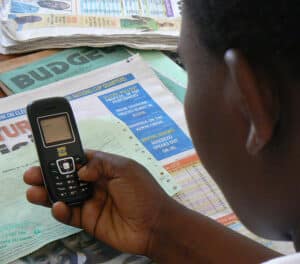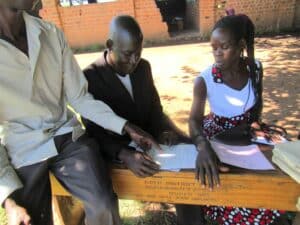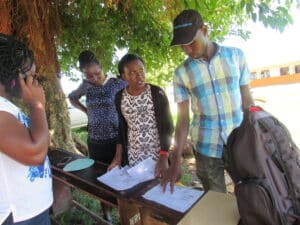January 17, 2024

“To keep you healthy while on your medication, always remember to eat well to boost your immunity, by including vegetables like malakwang, nakati, boo, and protein-rich foods like fish, meat, and eggs in your diet.”
In the Acholi region of Northern Uganda, people living with HIV regularly receive messages like this, along with reminders to take their medication, as text messages on their cell phones. The Acholi region of Uganda has one of the highest HIV burdens in the country and these important text reminders help people take their anti-retroviral treatment on time. If HIV patients keep up with their treatment, they increase their quality of life and help prevent spreading the disease to others. This initiative is just one example of the very successful USAID-funded project called Regional Health Integration to Enhance Services-North, Acholi (RHITES-N. Acholi), which operated from 2017-2023.
A commitment to collaborating with and building the capacity of local Ugandan health organizations drove the activity’s success. Through local systems, leadership, and resources, RHITES-N, Acholi was implemented with a focus on continuous learning and working ourselves out of the job to deliver comprehensive regional health and HIV/AIDS programs for underserved populations across more than 330 health facilities in eight districts.
Panagora is proud of our role providing high-quality learning; training of health workers, revitalization of systems for health facilities; technical assistance for HIV/AIDS, TB, malaria, and family planning (FP); and nutrition services to improve health and wellbeing in Acholi.
Supporting Local Partners to Serve More People
The activity worked closely with three local partners—the Local Partner Health Service (LPHS) Ankole and Acholi, Gulu Women Economic Development and Globalisation (GWED-G), and Gulu Regional Referral Hospital—to integrate a collaborating, learning and adapting (CLA) approach throughout their work and processes.

CLA is an approach that guides organizations implementing development projects to collaborate strategically, identify key learnings on an ongoing basis
throughout the project lifecycle, and adapt project accordingly to optimize outcomes and provide important blueprints for future projects and/or local partners. RHITES-N, Acholi partners used CLA to continuously strengthen technical approaches and interventions toward achieving improved health outcomes.
Village health teams and community health workers were essential partners throughout the activity. RHITES-N, Acholi provided training and educational resources for health workers across the spectrum of services including TB treatment follow up, testing for sexually transmitted infections (STIs), contraception counseling, identification of clients for HIV pre-exposure prophylaxis (PrEP), and referrals, to name a few. A better-resourced community health workforce helps communities access more convenient and affordable health services. This is critical for women seeking services like contraception or HIV services.
Project Higlights
Messaging and Mentorship to Address HIV/AIDS
To address Acholi’s high communicable disease burden, the project developed interventions for HIV/AIDS, TB, COVID-19, and malaria. Social and behavior change (SBC) communication was the foundation for much of the support, particularly to promote healthy behaviors related to HIV prevention and treatment. The team used a variety of knowledge gathering methods including root cause analyses and mapping of 124 HIV hotspots to design evidence-based approaches targeting key populations.
Panagora supported the design and implementation of interactive phone messages through the Viamo platform to promote HIV testing and adherence to antiretroviral therapy (ART) including keeping clinic appointments, picking up medication, and nutrition education. Clients could choose their preferred language for the messages – English, Luo (Acholi), or Kiswahili – the region’s three most spoken languages. The subsequent evaluation of this intervention found almost half of the respondents (49 percent) said that the messages motivated them to take their medicine on time and 23 percent said that they took their partner/family members for an HIV test as a result of listening to the phone messages.
To help prevent HIV transmission, the project team developed and provided materials to peer counselors and health workers to reach young people, commercial sex workers, and intravenous drug users with education and resources on PreP. Health care providers were trained on identification and referral of clients for PrEP, and identification of victims of gender-based violence for support service referral. This contributed to more than 6,368 individuals starting PrEP between 2018 and 2021.
A Curated Approach for Key Populations
 To better reach key populations with HIV services, the project team provided outreach workers, including community health workers and peer outreach teams, with a message matrix to guide their distribution of self-testing kits at the community level. Panagora supported the activity integrating key population-specific indicators into its overall monitoring and evaluation dashboard. RHITES-N, Acholi-supported interventions reached 8,896 individuals over the course of the activity. More than 95 percent of people engaged by outreach workers or clinical staff went for an HIV test and imitation of ART drugs increased by 94 percent between October 2020 and September 2021, when the peer navigation system, adherence clubs, and the Community Client-Led Antiretroviral Delivery system were in place.
To better reach key populations with HIV services, the project team provided outreach workers, including community health workers and peer outreach teams, with a message matrix to guide their distribution of self-testing kits at the community level. Panagora supported the activity integrating key population-specific indicators into its overall monitoring and evaluation dashboard. RHITES-N, Acholi-supported interventions reached 8,896 individuals over the course of the activity. More than 95 percent of people engaged by outreach workers or clinical staff went for an HIV test and imitation of ART drugs increased by 94 percent between October 2020 and September 2021, when the peer navigation system, adherence clubs, and the Community Client-Led Antiretroviral Delivery system were in place.
These outcomes reinforced the value of formative research in developing targeted interventions that effectively reach marginalized people.
Community-Centered Family Planning Support
Community health workers played a major role in the project’s family planning interventions in rural areas. Panagora supported this work by developing a social and behavior change strategy, gap assessment, and counseling guide for the community health workers. Community dialogues for families, first-time parents, young people, and cultural and religious leaders identified practices including early marriage, polygamy, children as heritage, unemployment, and the importance of girl child education as factors affecting family planning uptake in the area. The project implemented community health campaigns and identified community influencers to engage communities in these dialogues to discuss sociocultural factors, myths, and misconceptions about family planning to increase the acceptability of family planning.
Overall, the project team trained 654 community-based voluntary health workers in 25 rural sites of Acholi using these tools and methods. At these sites, uptake of family planning tools/tactics reached 59 percent, surpassing the national target. A total of 145,017 people accessed family planning services in the last year of the project; more than half received those services for the first time.
#PanagoraProud
We are proud to have supported this important USAID project and work with local health partners to ensure that the people of Acholi in Northern Uganda have access to quality health care and treatment.
To learn more about RHITES-N, Acholi and its achievements, explore URC’s project page.
